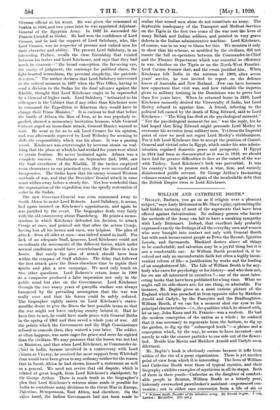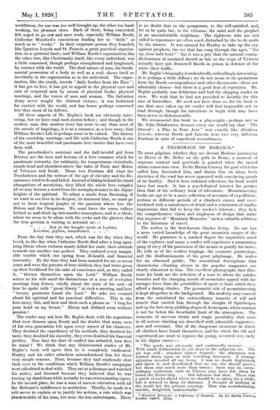WILLIAM AND CATHERINE BOOTH.*
REALLY, Barbara, you go on as if religion were a pleasant subject," says Lady Britomart in Mr. Shaw's play, epitomizing the half-hidden meaning of most of the arguments that have been offered against Salvationism. No ordinary person who knows the methods of the Army can fail to have a sneaking sympathy with Lady Britomart. Indeed, that excellent lady probably expressed exactly the feelings of all the everyday men and women who were brought into contact not only with General Booth but with such inconvenient people as Peter the Hermit, Ignatius Loyola, and Savonarola. Mankind desires above all things to be comfortable, and salvation may be a joyful thing but it is not a comfortable one. As William Booth preached it, it in- volved not only an uncomfortable faith but often a highly incon- venient reform of life—a justification by works and the leading of an unupholstered life. The Life of William Booth is for any- body who cares for psychology or for history—and who does not, for we are all interested in ourselves ?—one of the most inter- esting books that have been published for a long time. What we might call its side-shows are, for one thing, so admirable. For instance, Mr. Begbie gives us a most curious picture of the England which was preached at from opposite sides by Matthew Arnold and Carlyle, by the Puseyites and the Bradlaughites. William Booth, if we can for a moment shut our eyes to his principal characteristics—i.e., the qualities which he shared with, let us say, John Knox and St. Francis—was a modern. He had the modern conception of the nation as a whole;' he realized that it was necessary to regenerate from the bottom, to dig up the garden, to dig up the "submerged tenth "—a phrase and a conception which, by the way, he seems to have invented—not merely to rake the coarser particles to one side out of the flower- bed. Beside him Morris and Matthew Arnold and Carlyle seem dilettanti.
Mr. Begbie's book is obviously curious because it tells from within of the rise of a great organization. There is yet another point of view from which it is interesting. The lives of William and Catherine Booth were those of typical mystics, and their biography exhibits examples of mysticism in all its stages. Both of them in their youth—Catherine as the daughter of comfort- able people in Brixton, William Booth as a bitterly poor, hideously overworked pawnbroker's assistant—experienced con- version ; not in either case conversion from a life of sin or
• William Booth, Founder of the Salvation Army. By Harold Begtyle. 2 vols. London : ILacmIltan. [42s. mt.]
worldliness, for one was too well brought up, the other too hard- working, for pleasant vices. Each of them, being converted, felt urged to go outr and save souls, especially William Booth, Catherine Mumford's convictions leading her to " faith " as much as to "works." In their corporate person they founded, like Ignatius Loyola and St. Francis, a great practical organiza- tion on a spiritual basis ; and William Booth's organization, like the other two, like Christianity itself, like every individual, was a little coarsened, though perhaps strengthened and toughened, by contact with the world. The dual nature of man, his funda- mental possession of a body as well as a soul, shows itself as inevitably in the organization as in the individual. The organ- ization, like the youth, travels "daily further from the East " ; it has got to live, it has got to appeal to the physical eyes and ears of corporeal men by means of physical books, physical meetings, and the voices of men and women. The Salvation Army never sought the cloistral virtues ; it was fashioned for contact with the world, and has hence perhaps coarsened less than most of its fellows.
All these aspects of Mr. Begbie's book are obviously inter- esting, but we have read such stories before ; and though to the modern man this modern story has more to say than most of the annals of hagiology, it is an a romance, as a love story, that William Booth's Life is perhaps most to be valued. The history of his courtship, marriage, and life with Catherine Booth is one of the most beautiful and passionate love stories that have ever been told.
The pawnbroker's assistant and the half-invalid girl from Brixton are the hero and heroine of a love romance which for passionate intensity, for sublimity, for tempestuous vicissitude, stands head and shoulders above the tales of Paris and Helen, of Tristram and Iseult. These two Puritans did what the Troubadours and the writers of the age of chivalry and the Re- naissance tried to do and failed. Instead of hiding behind the timid abnegations of asceticism, they lifted the whole love complex (if we may borrow a word from the metaphysicians) to the Alpine heights of the spiritual. To adapt a simile from Browning, if we want to see love in its deepest, its intensest blue, we must go not to those tropical jungles of the passions where live the Helens and the Cleopatras. We must leave the warm valleys behind us and climb up into another atmosphere, and it is there, where we seem to be alone with the rocks and the glaciers, that the true gentian is waiting to astonish us:— " . . . Not in the bought smile of harlots,
Loveless, joyless, =endeared. . . ."
From the day that they met, which was the day when they loved, to the day when Catherine Booth died after a long agon- izing illness whose tortures nearly killed her mate, their attitude towards one another was perfect. They endured every imagin- able trouble which can spring from ill-health and financial insecurity. By the time they had been married for six or seven years and were the parents of four children they had twice given up their livelihood for the sake of conscience and, as they called it, "thrown themselves upon the Lord." William Booth writes to his wife amid the distractions of a tour of revivalist meetings long letters, chiefly about the state of his soul—of how he spoke with "great liberty" at such a meeting, and how "twenty penitents found the Lord." He asks her counsel about his spiritual and his practical difficulties. This is the love story, this, and here and there such a phrase as "I long for your head on my breast." Eldisa and Abelard seem without passion !
The reader may ask how Mr. Begbie deals with the aspersions that were thrown upon Booth and the doubts that many men of his own generation felt upon every aspect of his character. They doubted the expediency of his methods, they doubted his taste, they doubted his sincerity, they even doubted his financial probity. Now that the dust of conflict has subsided, how does he stand ? We think that any disinterested reader of Mr. I3egbie's book will agree that he is completely vindicated. Huxley and his other attackers misunderstood him for three very simple reasons. First, because they had studiously shut their eyes to the conditions which William Booth's campaigns were calculated to deal with. They sat at a distance and watched his antics, and frowned because they believed that he was rooting up dandelions while actually he was exterminating vipers. In the second place, he was a man of narrow education with all the Ilebraist's indifference to aesthetics. Thirdly, he made it a rule never to explain or to justify his actions, a rule which was characteristic of the man, but none the less unfortunate. There
is no doubt that to the prosperous, to the self-satisfied, and, let us be quite fair, to the virtuous, the saint and the prophet is an uncomfortable neighbour. The righteous who are not called to repentance are often much disturbed by the to-do made by the sinners. It was natural for Huxley to take up the cry against prophets, the cry that has rung through the ages, "Go up, thou bald head t" but it was a pity that the natural contra- dictiousness of mankind should as late as the reign of Victoria actually have put Bramwell Booth in prison in defence of the white slave traffic.
Mr. Begbie's biography is undoubtedly enthrallingly interesting. It is perhaps a little diffuse; we do not mean in its quotations from the Booth correspondence and other documents—these arc admirably chosen—but there is a good deal of repetition. Mr. Begbie probably was deliberate and had the skipping reader in view. We wish that he had not provided so lavishly for this race of butterflies. He need not have done so, for his book is one that once taken up the reader will find impossible not to read through, though his intentions to begin with may have been never so dishonourable.
We recommend this book to a playwright—perhaps not to Mr. John Drinkwater, because every one would say that "The General : a Play in Four Acts" was exactly like Abraham Lincoln, whereas Booth and Lincoln were two very different Puritans in spite of superficial resemblances.



































 Previous page
Previous page